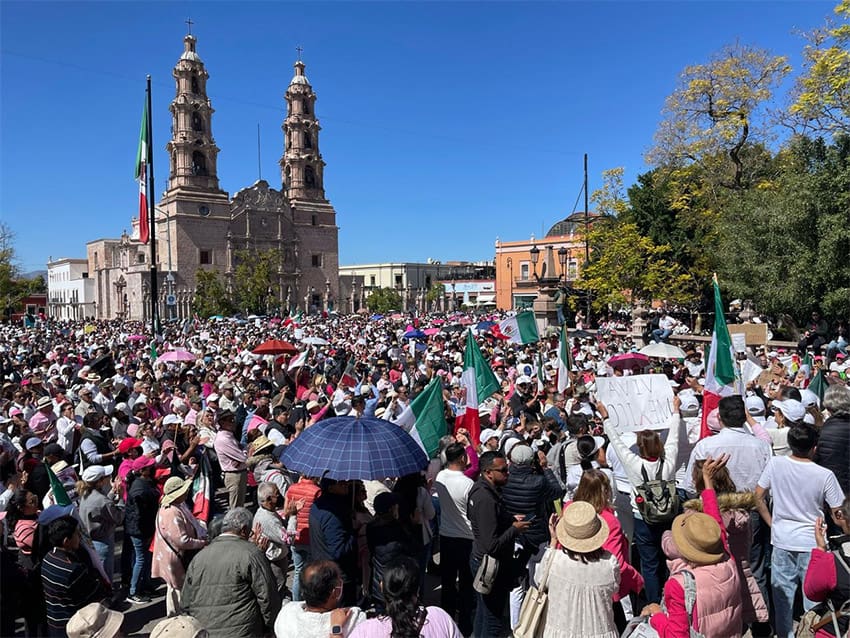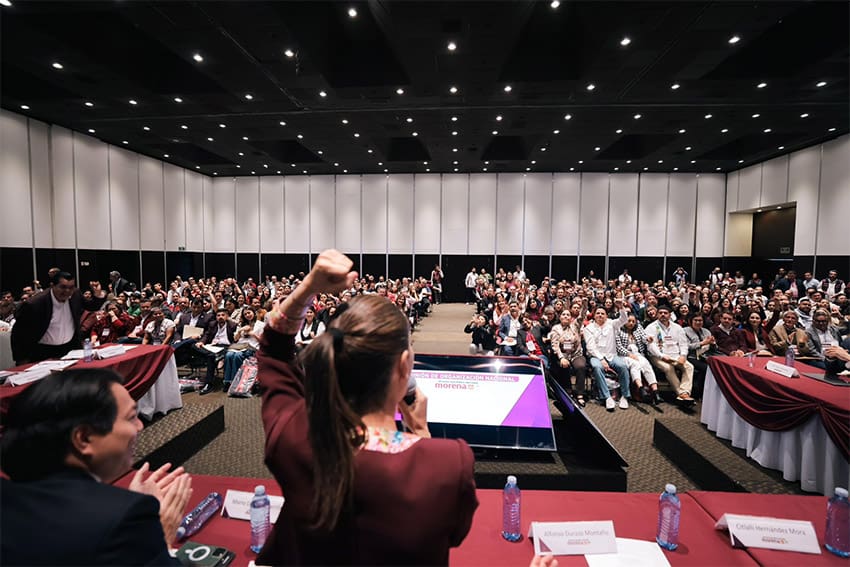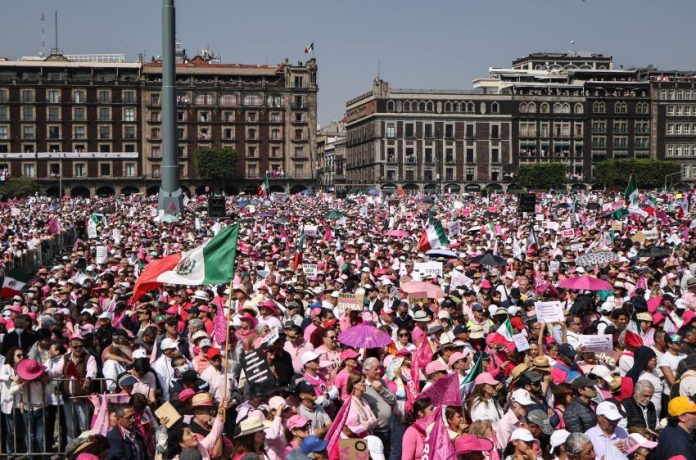Citizens took to the streets of Mexico City and numerous other cities across Mexico on Sunday to participate in pro-democracy protests amid what they see as an attack on the nation’s democratic institutions by President Andrés Manuel López Obrador.
At least 90,000 people gathered in Mexico City’s central square, the Zócalo, to listen to an address by former National Electoral Institute (INE) president Lorenzo Córdova at the conclusion of the “March for our Democracy” in the capital, while similar rallies drew thousands more in cities including Guadalajara, Monterrey, Puebla, Querétaro and Hermosillo.
The organizers of the protests — civil society groups that support or are affiliated with Mexico’s main opposition parties — asserted that over 700,000 people descended on the Zócalo, a figure more than seven times higher than the official count by authorities in the capital. Many of the participants wore pink and white — which feature in the INE logo — to demonstrate their support for the electoral authority, which López Obrador sought to overhaul with a sweeping electoral reform package that was struck down by the Supreme Court last year.
The demonstrations came 3 1/2 months ahead of Mexico’s presidential and congressional elections and two weeks after the president submitted 20 constitutional reform proposals to the Congress, including ones aimed at eliminating a number of autonomous government agencies, allowing citizens to directly elect Supreme Court justices and other judges and significantly changing Mexico’s electoral system.
In his more than five years as president, López Obrador has been a frequent and ardent critic of various autonomous government agencies, which he considers superfluous and claims were “created to legalize corruption.” He has also been highly critical of the judiciary, which he asserts is at the service of criminals and a “greedy minority” of citizens, and the INE, which he believes is bloated and which — in an earlier iteration — he accused of facilitating fraud in the 2006 and 2012 presidential elections he lost. His latest electoral reform proposal aims, among other things, to reduce the number of INE councilors and to rename the body the National Institute of Elections and Consultations.
Some protesters in the Zócalo on Sunday said they weren’t specifically demonstrating against the president, but rather wanted to show their support for the nation’s democratic institutions and advocate for clean and fair elections. But anti-AMLO chants such as “narco-presidente,” a reference to recently aired accusations that his 2006 presidential campaign received drug money, and “fuera López” — effectively a directive to “leave office now” — were a feature of the rally.
🗣️ “Hoy todo eso está bajo amenaza, pasamos más de 40 años construyendo una escalera democrática, y hoy, desde el poder, quién llegó a ese primer piso por libre voluntad de ciudadanía, pretende destruir esa escalera para que nadie más pueda transitarla”: Lorenzo Córdova durante… pic.twitter.com/1spvkhbPTG
— El Universal (@El_Universal_Mx) February 18, 2024
Former INE director Lorenzo Córdova gave an impassioned speech at the Mexico City march.
In his speech in the Zócalo, Córdova didn’t explicitly mention the president or the ruling Morena party, but nevertheless made it clear that he holds them responsible for the “risks” he believes Mexico’s democracy currently faces.
“Today we are demonstrating in the streets of our country due to the risks that democracy faces, amid attempts to damage the conditions that allow us to have free and authentic elections and to dismantle the institutions that protect us from abuses,” he said.
Córdova said that the nation’s democratic institutes can only be “touched” for the purpose of “improving them.”
If the aim is to “dismantle them, tear them apart or capture them, we say loud and clear — of course they cannot be touched,” he said.
Democracy in Mexico — which for all intents and purposes is only 24 years old — “didn’t fall from above, it’s the result of the struggles of many citizens,” said Córdova, who claimed that Mexico is confronting a political “project of authoritarian regression.”
A Mexico City resident identified only as Tatiana told the EFE news agency that she decided to take part in Sunday’s march “to protest against the abuse and co-option of institutions that took a lot of work to build as a counterweight to power.”
“I believe [López Obrador] has destroyed the country and polarized the people,” she said.

Maritza Gómez told EFE that she believed that the government would interfere in the upcoming elections in the lead-up to, and on, election day on June 2.
“The government won’t allow [people] to vote against it. It’s going all out to try to stop [people voting for the opposition]. I’m scared, there’s going to be theft of ballot boxes and … [outside Mexico City] the narcos won’t allow people to vote or will tell them to vote for Morena,” she said.
Juan Carlos Grandío of México state expressed widespread dissatisfaction with López Obrador’s presidency.
“He promised us a lot of things that he didn’t carry out. … I voted for him, but I realized that he deceived us,” he told EFE.
“… I would ask him to stop allying himself with the narcos and not to interfere in the elections, but there are a thousand other things to improve like security or the health system,” Grandío said.
Speaking to the El País newspaper, Natalia Carrillo said, “We want our votes to count and to live in a true democracy.”
“This is not against the president, but it’s true that the line between opposing the government and defending our rights is becoming increasingly blurry,” she said.
Gerardo Villadelangel, another protester, told El País that “the defense of democracy has become an opposition struggle, especially when we’re facing a dictatorship under construction.”
López Obrador is constitutionally barred from seeking re-election, but some analysts see the presentation of his constitutional reform proposals as a means to set the agenda for his likely successor, Morena party candidate Claudia Sheinbaum, and thus continue to have a bearing on politics after his six-year term ends.

Most of the proposals will likely be rejected by the Congress before the election as they require the support of two-thirds of lawmakers to pass. Consequently, Sheinbaum — who has expressed support for the proposals and is pledging to continue the “fourth transformation” of Mexico initiated by her political mentor — would be left to navigate their path through Congress, provided she wins on June 2, as poll results currently indicate she will.
Xóchitl Gálvez, presidential candidate for the three-party Strength and Heart for Mexico opposition alliance, didn’t attend any of the demonstrations held around the country on Sunday, but expressed her support for them in a video posted to social media.
“Today I want to celebrate the civic energy and citizen force that was on display this morning in various cities of our country and in other parts of the world,” she said.
“It fills me with hope and optimism to see this enormous participation of Mexican women and men. Democracy is exercised at the ballot box but also in the streets and public squares. While Mexico has citizens who go out to demonstrate to defend their democracy, who exercise their right to the free expression of ideas, there won’t be an authoritarian temptation that can send our institutions to hell,” Gálvez said.
After attending INE offices to officially register her candidacy, Sheinbaum on Sunday said it was “important” to “point out the insincerity and hypocrisy of those who speak about or march for democracy” when they previously “promoted electoral frauds” and ignored “vote-buying.”
That message was presumably directed at politicians affiliated with the Institutional Revolutionary Party (PRI) and National Action Party (PAN) who participated in the protests. The PRI was a dominant and authoritarian power in Mexico for most of the 20th century, while the PAN was in power for the first 12 years of this century before the PRI returned to office under former president Enrique Peña Nieto in 2012. They are aiming to return to power by banding together to form the alliance that is backing Gálvez. The Democratic Revolution Party, or PRD, is the third member of the coalition.
Sheinbaum, who was part of López Obrador’s government when he was mayor of Mexico City in the early 2000s, said that Morena, or the so-called “fourth transformation” movement “defends democracy” and “the active participation of society” whereas opposition parties only feign to do so.
“It’s pertinent to mention that our constitutional change proposals seek to strengthen the electoral and participatory democracy for which the people of Mexico have always fought,” she added.
With reports from Animal Político, El País, EFE, Reforma and El Economista
